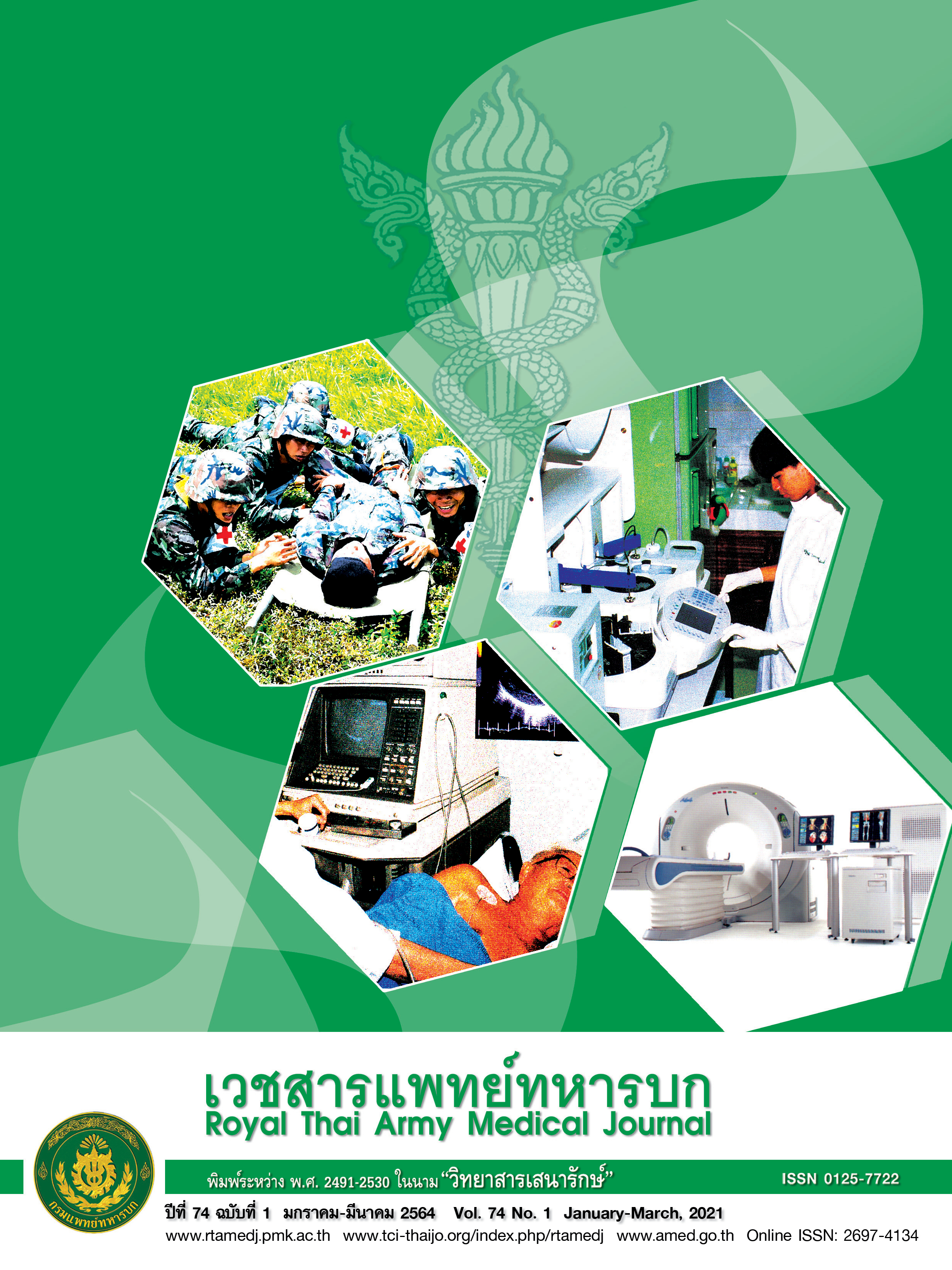Prevalence of Cognitive Impairment in Patients with Stroke: Secondary Data Analysis
Main Article Content
บทคัดย่อ
บทนำ ความสามารถของสมองบกพร่องเป็นภาวะที่พบได้บ่อยในผู้ป่วยที่รอดชีวิตจากโรคหลอดเลือดสมอง ความชุกของภาวะความสามารถของสมองบกพร่องในผู้ป่วยโรคหลอดเลือดสมองมีความแตกต่างกันในแต่ละประเทศ วัตถุประสงค์ เพื่อศึกษาความชุกของภาวะความสามารถของสมองบกพร่องในผู้ป่วยโรคหลอดเลือดสมองและปัจจัยที่เกี่ยวข้อง วิธีการ การวิจัยครั้งนี้เป็นการวิเคราะห์ข้อมูลทุติยภูมิจากโครงการวิจัยเรื่อง ความรอบรู้ด้านสุขภาพจิตและความผิดปกติทางจิตของผู้ป่วยโรคหลอดเลือดสมอง ซึ่งเป็นการวิจัยเชิงพรรณนาแบบภาคตัดขวาง กลุ่มตัวอย่างเป็นผู้ป่วยโรคหลอดเลือดสมองที่เข้ารับการรักษาในโรงพยาบาลสรรพสิทธิประสงค์ จังหวัดอุบลราชธานี จำนวน 180 ราย เก็บข้อมูลโดยใช้แบบทดสอบสมรรถภาพสมองของไทย ใช้สถิติ Logistic Regression Analysis ในการวิเคราะห์ปัจจัยที่มีผลต่อภาวะความสามารถของสมองบกพร่อง นำเสนอค่า Adjusted Odd Ratio และช่วงเชื่อมั่น 95% Confidence Interval ผลการศึกษา ความชุกของภาวะความสามารถของสมองบกพร่องในผู้ป่วยโรคหลอดเลือดสมอง ร้อยละ 17.22 ปัจจัยที่มีความสัมพันธ์กับการเกิดภาวะความสามารถของสมองบกพร่องในผู้ป่วยโรคหลอดเลือดสมองอย่างมีนัยสำคัญทางสถิติ (p < 0.05) คือ ผู้ป่วยที่มีอายุตั้งแต่ 60 ปีขึ้นไป (AOR=3.180, 95%CI 1.304-7.753) สรุป กลุ่มตัวอย่างมีความชุกของภาวะความสามารถของสมองบกพร่อง ร้อยละ 17.20 และปัจจัยที่มีความสัมพันธ์กับภาวะความสามารถของสมองบกพร่องในผู้ป่วยโรคหลอดเลือดสมอง ได้แก่ ผู้ป่วยที่มีอายุตั้งแต่ 60 ปีขึ้นไป ดังนั้น บุคลากรทางการแพทย์ที่เกี่ยวข้องจึงควรตระหนัก และหาแนวทางในการจัดการดูแลผู้ป่วยกลุ่มดังกล่าวต่อไป
Downloads
Article Details
บทความในวารสารนี้อยู่ภายใต้ลิขสิทธิ์ของ กรมแพทย์ทหารบก และเผยแพร่ภายใต้สัญญาอนุญาต Creative Commons Attribution-NonCommercial-NoDerivatives 4.0 International (CC BY-NC-ND 4.0)
ท่านสามารถอ่านและใช้งานเพื่อวัตถุประสงค์ทางการศึกษา และทางวิชาการ เช่น การสอน การวิจัย หรือการอ้างอิง โดยต้องให้เครดิตอย่างเหมาะสมแก่ผู้เขียนและวารสาร
ห้ามใช้หรือแก้ไขบทความโดยไม่ได้รับอนุญาต
ข้อความที่ปรากฏในบทความเป็นความคิดเห็นของผู้เขียนเท่านั้น
ผู้เขียนเป็นผู้รับผิดชอบต่อเนื้อหาและความถูกต้องของบทความของตนอย่างเต็มที่
การนำบทความไปเผยแพร่ซ้ำในรูปแบบสาธารณะอื่นใด ต้องได้รับอนุญาตจากวารสาร
เอกสารอ้างอิง
2. Sun J-H, Tan L, Yu J-T. Post-stroke cognitive impairment: epidemiology, mechanisms and management. Ann Transl Med. 2014;2(8):80-.
3. Rist PM, Chalmers J, Arima H, Anderson C, Macmahon S, Woodward M, et al. Baseline cognitive function, recurrent stroke, and risk of dementia in patients with stroke. Stroke. 2013;44(7):1790-5.
4. Gutiérrez Pérez C, Sävborg M, Påhlman U, Cederfeldt M, Knopp E, Nordlund A, et al. High frequency of cognitive dysfunction before stroke among older people. Int J Geriatr Psychiatry. 2011;26(6):622-9.
5. Douiri A, Rudd AG, Wolfe CD. Prevalence of poststroke cognitive impairment: South London Stroke Register 1995-2010. Stroke. 2013;44(1):138-45.
6. Yu KH, Cho SJ, Oh MS, Jung S, Lee JH, Shin JH, et al. Cognitive impairment evaluated with Vascular Cognitive Impairment Harmonization Standards in a multicenter prospective stroke cohort in Korea. Stroke. 2013;44(3):786-8.
7. Tham W, Auchus AP, Thong M, Goh ML, Chang HM, Wong MC, et al. Progression of cognitive impairment after stroke: one year results from a longitudinal study of Singaporean stroke patients. J Neurol Sci. 2002;203-204:49-52.
8. Das S, Paul N, Hazra A, Ghosal M, Ray BK, Banerjee TK, et al. Cognitive dysfunction in stroke survivors: a community-based prospective study from Kolkata, India. J Stroke Cerebrovasc Dis. 2013;22(8):1233-42.
9. Tang WK, Chan SS, Chiu HF, Ungvari GS, Wong KS, Kwok TC, et al. Frequency and clinical determinants of poststroke cognitive impairment in nondemented stroke patients. J Geriatr Psychiatry Neurol. 2006;19(2):65-71.
10. Harikarnpukdee C. The prevalence of cognitive impairment in post-stroke patients in Kalasin Hospital and associated factors for cognitive impairment in post-stroke patients. Journal of Disease and Health Risk DPC3. 2018;12(3):1-10.
11. Chanchaem R, Wongcharoen S. Prevalence of post-stroke dementia in Northern Thailand. Journal of the Department of Medical Services. 2018;43(2):124-30.
12. Mohd Zulkifly MF, Ghazali SE, Che Din N, Singh DKA, Subramaniam P. A review of risk factors for cognitive impairment in stroke survivors. The Scientific World Journal. 2016;2016:3456943.
13. Division of Health Informatics and Surveillance. Epi Info™: statistical calculators. U.S. Department of Health and Human Services: Center for Surveillance, Epidemiology and Laboratory Services (CSELS); 2018.
14. Murman DL. The impact of age on cognition. Semin Hear. 2015;36(3):111-21.


